By Bruce Carlson
Hello and welcome to eastofstlouis.com.

Bruce and Karen Carlson, creators of eastofstlouis.com and authors of these articles.
We’re Bruce and Karen Carlson. We recently moved to the Metro East area of Illinois. It’s a whole new world out there. Our goal with this website is to share our exploration of the Metro East area. As we find businesses and services we use in our daily lives, we’ll share how these businesses and services have helped make our lives better and easier to live.
We’re calling our move to the Metro East area retirement, but we’re not quite sure what that means. By sharing our store with you, we hope you too will gain a better sense of what the Metro East area has to offer and how their businesses and services can improve your lives and build a better community.
An interview with Norma McCandless, founder of Metro East Diaper Bank
Bruce:
Tell us about yourself, how you got here, and what you’ve started.
Norma:
Okay. So I’m a veteran. My husband is retired Air Force, and we ended up here for our last assignment, I worked in St. Louis for a few years but, I teach college now, but prior to that, I worked in St. Louis. I worked at ten different clinics, as a health education supervisor. At every location, somebody was always knocking on my door for diapers asking, Ms. Norma, do you have any diapers? So, I started keeping some extra diapers in my offices. At one clinic in St. Louis, we had an attic with an office up there and Catholic Charities told us to come over there and get all the diapers that we wanted.
I had a lot of diapers up there. Every clinic had a diaper need from patients. And then I said, I want to do this one day. So back around 2011, I started thinking about it, and I said, I think I’m ready to do it. But I was working on a genealogy book for my family, and I just couldn’t concentrate on both, so I had to put one of them on the back burner; that was the diaper bank. I finally finished the book in 2019 and had it published in 2020, and that’s when I started the legal paperwork for the 501c3 nonprofit.
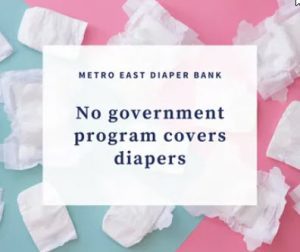
Then I had to find out if there was a need in the Metro East. I did an assessment first. I’m used to doing assessments everywhere I go. Demographics of the community, poverty stats, needs assessments, things like that. I did not want to have a duplication of services, so I had to see if there was another diaper bank in the area. Now, there’s one on the other side of the river for St. Louis City, but there was not one here in Southern Illinois. I found one location that mainly distributes food. They do diapers but diapers are only a small part of their mission. They’re in Madison County. So I said, okay, there’s a need for this area, then I started the Metro East Diaper Bank. I had to cold call some people seeking a diaper need. We started off with the first delivery which was like 438 diapers. And three years later, we’re at 15,000 diapers a month.
Bruce:
That was three years ago.
It’s grown exponentially
Norma:
It’s grown exponentially. So, as a nonprofit, we’re always trying to think of fundraisers because we always need money. One of the main things we need is permanent space. We’ve seen a lot of vacant buildings, but you can’t get to the landlords. We’ve even tried calling the leasing manager, would they be willing to loan us space for a tax write-off? And we have not gotten anywhere with that. We’re in desperate need of space.
We have a storage facility where we keep the diapers in Shiloh. And then one of our volunteers found us a place up in Highland, which is a warehouse, in case we get a truckload donated to us. We’ll go up there, get the diapers, and bring them back down here. Since word has spread that we exist, we’ve gotten more partners. We have 26 community partners. We pack diapers once a month. Volunteers come and support us. Shiloh allows us to use Klucker Hall for free, but if somebody rents it, we get bumped out. So, there’s been a couple of times somebody rented it and we had to find another space. We’ve packed at a library, a church. and the Scott VFW allowed us to pack there as well.
Karen:
So when you’re packing diapers, what does that exactly mean?
Norma:
Okay, so when we pack once a month, we have two shifts. One morning shift, that’s ten to noon, and then the afternoon shift is twelve to two. And I have an e-sign-up that I send out, and then people sign up. So we’re up to 15 people per shift because we have so many diapers to pack. And we have our regular volunteers, and we have new faces every month as well.
Karen:
So do you sort like X many of this size?
Norma:
All the sizes are dispersed at a table. So you’ll have newborns, ones, twos like that, and then people usually just pick whatever’s available or wherever they’re needed to pack diapers. And the diapers are packed in plastic wrap, and they’re in bundles of 25. Then our sticker goes on the package, what size it is, and with our logo. Then while our volunteers are packing, my husband does the separation by community partner. So he and maybe our president or whoever volunteers over there to help him. They’ll say, okay, this is how many we need for the health department. This is how much we need for Bethany Christian. This is how much we need different partners. And then we actually deliver the diapers because we do not have a permanent site. We drove over 2500 miles a year.
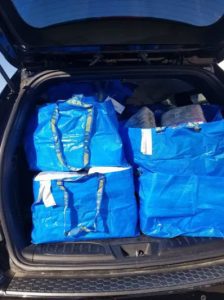
We drove over 2500 miles a year
Karen:
Quite a production.
Norma:
Yeah, it is.
Karen:
And as you said, it’s grown so much, even though I imagine going through COVID and all of that.
Norma:
My president thought I was nuts. She said, you want to start a company, I mean, a business during COVID. I said this is when I can do it. Now I’m going to start. It just like it feels like a good time. Especially after I was so busy with the book. I didn’t even think about COVID at first.
Karen:
And the need for diapers doesn’t stop.
Norma:
And we just tested the waters. So that November, before we actually had our delivery, the Metro East Literacy Project, handed out free books. So she said, oh, I want to do a collaboration. She said we’ll do free books and free diapers. And we did that. She got all these books and bags donated. Oh, my goodness. The line was around the building for diapers! We donated over 1200 diapers that day in Fairview Heights. With 26 community partners, we’re serving in four counties, which includes partnerships with two health departments.
Karen:
You partner, with the health departments in each of those counties?
Norma:
Then we’re only in two right now. We’re in St. Clair County. We deliver in Madison County, Clinton County, and Jerseyville.
Bruce:
Jerseyville, where’s that?
Norma:
That’s about an hour from here. We partner with the Jerseyville Health Department and St. Clair County Health Departments, those are the two that we collaborate with right now. We have another pending health department partner. We currently deliver to the Village of Albers and they disperse diapers to the village and Carlyle. We have a partner who drives all the way from Carlyle because there’s such a need. Okay. I’m not sure if you heard of that yet. Large partners with thousands of diapers pay a cheaper price than the store for their diapers. Anyone receiving 200 diapers or less a month is free.
Karen:
I’ve seen it on the sign. Carlyle.
I’m seeing so many leaky diapers
Norma:
Carlyle is a distance from us. We’re based in St. Clair County. I got a call from a lady there. I had been to Carlyle once to the beach years ago. I didn’t know anything about the town. And she was saying, oh, I’m seeing so many leaky diapers, there was a dire need. And then there’s another town we haven’t even gone there yet. That’s Centralia, I think 30 minutes away from Carlyle. And we were told that’s an even more impoverished, so you see, the need is there but growing because we didn’t know about those areas and their stats, even though they exist. This is why we try to think of a and plan lot of fundraisers. I’m going to take training here soon about master fundraising plans for nonprofits because we need more money.
Karen:
Oh, goodness. Doesn’t every not-for-profit need more funding?

Norma:
You can’t rely on grants.
Karen:
No, there’s so many. And when you’re small and you’re new, they don’t even recognize you.
Norma:
One of our shelter partners is getting ready to close for good, and we just partnered with a new shelter Journey of Hope. Journey of Hope which is a women’s shelter for pregnant mothers in crisis in O’Fallon.
Karen:
Do you do anything with schools, like teen moms or whatever? What are their needs for diapers? It was just a thought that popped into my head. I don’t know.
Norma:
Now, I’ve taught that population while I was in St. Louis, but over in Metro East, no, No one’s contacted us about any teen parent programs. Now we do preschool programs. We’ve had preschool programs and calls. We have a couple of preschool programs that are community partners. I had a call the other day, and this lady, one of the staff members, didn’t know what to do. She says one of the kids was there and he had absolutely nothing. So we get about five emergency calls per month. I just got one the other day from Alton. Alton is a distance from here, too. And told the parent to go over to the East Alton library, community partner.
10 libraries provide diapers
So that’s another thing. We partnered with ten libraries. We did that because the other community partners have set hours. So, on the weekends, if you need a diaper or some diapers, you can go to the library. And that has been very successful so far, and all the way up to East Alton. The parent said I called Alton. They don’t have that size. We didn’t have the size in stock either. so, our next packing date is the next weekend, the 30th.
I’ll remember to send that size to the library so he can go over there. He had eight kids, with the two youngest in diapers and he and his spouse are on disability. I got a call last month from a lady in O’Fallon. She lived at a hotel. She said, I have two diapers left, (I usually give them a location where they can go get the diapers), but she had no transportation, so I took the diapers to her. That’s the joy of serving parts of a rural area. We couldn’t do that in a major city.
Karen:
Do you find there are particular times of the month? Is it towards the end of the month when they’re running short?
Norma:
I’ve heard people say, oh, I’m trying to make it to payday versus somebody who just doesn’t have any diapers at all. I’ve had people be the devil’s advocate too because, you know, a lot of times when you’re helping someone in need, some may think of it as a handout. They may have either forgotten their days of struggle, no one helped them, they never had to struggle, and/or they believe others should do it the same way they did but life doesn’t operate that way for everybody. You never know one’s lot in life and the coping skills to deal with the cards life handed them. Even if a parent has made a bad choice, why should the baby suffer? One just doesn’t know what the situation is going to be. So you can’t judge one person and say, okay, why don’t they use cloth diapers? Okay, daycares will not accept cloth diapers at all.
If they don’t have enough diapers, many just stay home from work. Last year, we found out if they didn’t have enough diapers, I was reading an article, and some were using towels. let them remain in diapers longer than necessary, or plastic bags for diapers. Clean diapers prevent infection from being in wet diapers for extended periods of time. A long-time friend told me a few months ago, that the diaper bank brought back memories of when they were a young military family and couldn’t afford diapers. She sent a donation.
A memorable incident reminded me of our mission when I was going through the Scott Air Force Base gate one morning. They not only check ID cards but do a quick peep too. I had diapers piled to the ceiling in the back. The guard said, “You have a lot of diapers in there.” I said, “Yes, I’m delivering them to the First Sergeants.” He paused and said, “Those are the diapers that helped my son.” It tugged at my heart.
Karen:
Like you said, you never know.
Norma:
You never know. We partner with all 25 squadrons at Scott Air Force Base plus Airman’s Attic. Airman’s Attic is made up of volunteers providing free items to military members who are E-4 and below and their family members. It relies on volunteers to remain open.
Norma:
But they only open two days a week because I had a lady asking that, well, why do you deliver to the squadrons if you deliver to Airman’s Attic? Airmen’s Attic is only open two days a week. You need diapers every day. So that’s when we partnered up with the first sergeant.
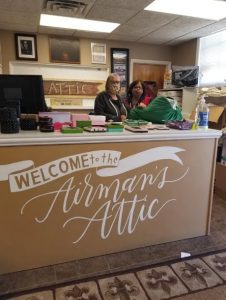
Bruce:
And just out of curiosity, who put together Airmen’s Attic? Is that something the Air Force did or some other group?
Norma:
It’s an Air Force operator. So volunteers are kind of internally created. Probably under their family readiness program. Then we just had a meeting. Me and my president had a meeting last month with the lady I was telling you about with the Belleville diocese. I think she said there were like eight or nine churches, so up in Damiensville. I’ve never been to Damiensville, but I will be going. So besides diapers, I also believe education is important too, to teach parents. So I used to teach prenatal education when I worked in St. Louis. So I said, I’m going to incorporate some education in this for the parents.
Education is important
Unlike other diaper banks where diapers are their sole purpose, we also have two parenting programs per year, and one of them that’s popular is the Healthy Baby Forum (HBF). It’s held every June, and we have guest speakers. This year, we had a pediatrician, a doula, and a literacy expert. Last year, we had a nurse practitioner, a pediatrician, and a literacy expert. I always invite the literacy expert because reading while pregnant then for life is very important. The parents eat and receive gift bags (gifts are donated). One group donated brand-new baby books. It’s like five cute little books per gift bag.
I had another business owner donate some nice items from her baby boutique. Parents also receive a bundle of free diapers as part of their gift bags. I was talking with our president who suggested we rotate the HBF since we’re in four counties. We recently had a meeting with a Hispanic representative from the diocese, she wanted us to come to Damiensville. Parents from Damiansville, Breezse, and Fairmont City will attend. So next year, the HBF is going to be in Damiansville. She’s going to do all the interpreting because the parents are Spanish. Damiansville is in Clinton County. Where I used to work. I wanted to develop a Spanish prenatal education program, but the resources weren’t available then so I’m excited about this collaboration.
Bruce:
It’s probably a small community.
Norma:
Damiensville and Breese, is that near you? About 45 minutes. It is a lot closer to our president through. The rep said there are a lot of migrant workers and poverty there. She wanted us to capture that group too. The rep has been here for five years. She came from Argentina.
Bruce:
We’ve worked a little bit with the Hispanic groups. Our parish in West Chicago was very Hispanic.
Norma:
When I worked in St. Louis, one of our clinics was primarily Latino, so I taught prenatal education over there. When I came over here, they didn’t have one, and it was very difficult starting one, trying to find an interpreter, somebody who was bilingual. And I was telling my boss, I said, it is so needed. So I was very happy to find this community, especially with an interpreter who’s going to do everything. I love mission work because I believe we’re put here, once we get stable on our feet, we’re here to help other people.
Karen:
It’s paying it forward.
Norma:
I tell my college students when lecturing about spiritual health, that it is not just brick and mortar. Spiritual health is one dimension of overall health and it is about having a sense of purpose. You got to find your sense of purpose in life. I was reading about the Bill and Melinda Gates Foundation, and I was very impressed. Culturally, they didn’t go in there demanding, you’re going to do this or that. Melinda said to reduce the population. “We had to find out who was in charge of the family. In one culture, it might have been the husband, and another. It might have been the mom.” And she said we had to sit down and educate those family leaders on contraception to reduce the population.
They didn’t go in there saying, you’re going to do this
Bruce:
You saw a need for diapers. What was that initial experience you saw the need for diapers? What was it that gave you that thought?
Norma:
When I was in the clinics.
Bruce:
So people came in and they didn’t have diapers.
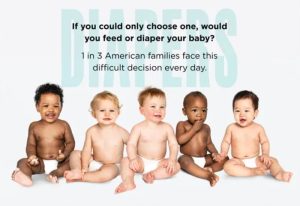
Norma:
They didn’t have any diapers. The receptionist would always call my office asking, “Norma, do you have any diapers back there? Or someone would knock on my office door, depending upon the clinic’s location. I gave somebody diapers, somebody else would come in. They’re like okay, we’re going to ask if there are any diapers. And that occurred at every clinic. I’m talking about ten clinics. Some people did not show up with diapers or didn’t have enough diapers. They ran out if the doctor’s appointment went overtime. In fact, in my prenatal education class, I started a list for “What you Need in a Diaper Bag.” That was handed out in my prenatal education class. Many just didn’t know. I put one in the HBF gift bag too.
Karen:
And it’s just the education.
Norma:
Yeah, a lot of it is.
Bruce:
And I guess the next step that pops into my mind, because I guess we’re going back to our mission experience and how we learned about things is there a demographic that shows this need?
St. Clair County has a 19% poverty rate
Norma:
I like to assess statistics because it gives a bird’s eye view of what is amiss. Remember when I told you I did my assessment? I looked at demographics and I looked at the statistics for each county then the towns, so when we get a new request, I’ll go and look at the statistics for that county plus ask around because some stats can be deceiving. Just because a county has a poverty rate it may show a high average salary that doesn’t reflect the actual problems. One community for instance has an average salary of $80,000+ but I not only found poverty there but middle-class folks in need too. One affluent county started a food and serves 500 families a month!
Some officials don’t seem to be aware of the pockets of poverty in their towns or counties or it is of no concern to the people in a position to do something. St. Clair County has a 19% poverty rate. Clinton County has a 13% poverty rate in the town of Carlyle itself. We’ve approached their health department and will see where it ends up. We were getting so many monthly emergency calls from Madison County, that we started delivering to their food pantry and library, but we’re not partnered with their health department, not yet anyway.
Bruce:
So people are calling you and not necessarily going through the county then.
Norma:
They don’t have any resources. There are no resources from the county.
Bruce:
Does the county realize that there’s an issue?
Norma:
Once it’s brought to their attention, they either say, yeah, well, we know, but they’re not doing anything, or maybe they don’t know. And sometimes you don’t have the right people in those jobs. Over in St. Louis, they have it mapped out by zip code. Hey, we have a lot of poverty in this zip code. You don’t see that done over here. Federal funding, state funding, and local funding are going to be geared to programs in that zip code because you have a lot of issues in that zip code. But I have not seen that done here.
Bruce:
I want to say then it sounds like to me there’s an awareness issue at the leadership level as to understanding what’s going on in their county.
Norma:
Yeah, I’ve worked in St. Louis and southern Illinois in marginalized communities for over 20 years and there’s not a lot of resources in St. Clair County. It is almost the same size in population as the city of St. Louis. Now that one of the transitional homes is closing. The social worker said they must find places for the families to go. That’s difficult in a county with no shelters. I don’t know what they’re going to do.
Karen:
Well, the interesting thing is with the missions we have done, a lot of times people will come back home and then they feel sort of they understand they’ve experienced things differently and then they find things in their own communities. Like, wow, there are poor people in my backyard.
Norma:
Exactly.
Karen:
It opened their eyes. And then people would become a little emboldened and a little more motivated to make a change on their own. You don’t have to go thousands of miles to Bolivia to help, to find people, to help. There are people in your own community, in your own backyard that can use help. And so a lot of times people would get involved with things, whether it’s food pantry or whether it’s whatever it might be.
Trying to plant those seeds
Norma:
And that’s why I’m trying to plant those seeds in my college students. I said everybody in here is a resident wherever you live. and learning to give back as a volunteer is important. I’ve asked a class full of students, how many of you all volunteer? Not one hand.
Karen:
I think the important thing is it doesn’t mean money. What it means is your time volunteering, helping to pack diapers or deliver diapers or whatever, of 1000 things.
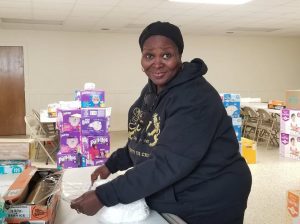
Norma:
Yeah, one of our partners, I just looked at all the volunteers, I mean, elderly people, all the volunteers. There were no young people in there at all. And I’m like, where are the young people?
Karen:
Yeah, the older population gets it. They want to pay it forward.
Norma:
And they probably grew up in communities that helped.
Karen:
And socially, it’s such an important thing, especially for seniors, we have a common goal, and we have a common bond.
Norma:
One of our volunteers was from Randolph County. I’ve taught that campus out there, too, but that’s like an hour away. And he did offer us some space there. He was one of the politicians there. I said, no, that’s a little far.
Karen:
Anyway, my wheels are turning a little bit. And that’s what happens. You hear a need, you see a need, you try to find a need. I get it.
Norma:
That’s been our pressing need, finding permanent space.
Bruce:
How big do you need?
Need a bigger space
Norma:
At least a minimum of 1600 Sq Ft; small but we’ll take it. Because we don’t have anything right now. Once we get that space, some of our partners can actually pick up their diapers instead of us delivering them. Then some of our volunteers can come during the week, some are retirees, while some have volunteer hours from their employers. We have a lot of volunteers coming from the base. We’ve had months where we hardly had any. And then I just send an email to my first sergeant contact, and he sends some out, That’s been wonderful. Right.
Karen:
And once you get them and hopefully you capture their contact information, then it becomes part of your pool of people to reach out to, to say, we need this, Maybe they can’t physically come and help you pack diapers or deliver diapers, but those donations help you to secure those diapers so that you can serve the families and stuff.
Norma:
Yeah. This was what a fundraising lady was telling me.
Bruce:
Where do you see the future? Okay, you’re doing diapers. It almost sounds like you’re slowly expanding into other areas or at least you’re seeing opportunities and other things. How do you see this?
Norma:
Oh my gosh, my background, I’m like, oh, I wish I could do other things. Anything involving children and families. Right now, we’re just concentrating on that space. But I also see us expanding because these counties are so close here in southern Illinois. A larger space would allow us to receive deliveries, pack and store, all in one space. Our primary country is St. Clair because this is where we started, and this is where our largest number of community partners are.
Bruce:
So space is key. What about awareness to people of this need? What kind of plans do you have in mind? I’m a guy, I don’t normally think about diapers and things like that, but there seems to be a great need for something like this.
Norma:
Education is one of our ways of getting the word out. We use social media and advertise locally. One of our community partners said prior to us talking to her, she had no idea the need was so great. One of my pastor friends is a district superintendent and I’m constantly calling him for some of his church contacts so we can let the churches know what we’re doing if their congregations are in need. The lady who called me from Carlyle asked, “How are we going to get the word out?” I called my friend, and he gave me a contact in Carlyle.
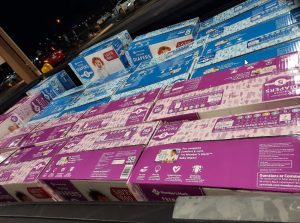
Karen:
We’re just getting established in our parish, there’s a women’s organization. Do you have people who can come out, and do a presentation on education and awareness?
We do presentations
Norma:
I’ve been doing that for the last couple of weeks. Not only the O’Fallon – Shiloh Chamber’s podcast but also guest speaking for social organizations and businesses. Our president does it too. Next Thursday I got one, it’s a women’s group in O’Fallon. I just gave another presentation last week.
Karen:
And I might talk to someone at St. Joseph’s in Freeberg and St. Agatha in New Athens. We’re pastored by the same pastor, we could do a presentation for both of the parishes’ women’s groups or something like that just to try to get as many people in the room to hear about it.
Norma:
Another thing they don’t have over here is when I worked in St. Louis, the Catholic Church had put together all the agencies in the city. I mean, it was incredible. I still have that book somewhere. All I had to do was look for an agency and call them. We also had quarterly consortium meetings with multiple agencies.
Bruce:
We had something like that. Well, I know from DuPage County where our last parish was. They had a book that had all the agencies and everything. So if somebody came into the parish and said, I need this, we could give a list of agencies.
We don’t have a list
Norma:
And they had one in St. Louis like that. I’ve seen nothing like that over here. In fact, I asked another organization about all the food pantries, and he said, we don’t have a list. I had to find the food pantries we partner with on my own.
Karen:
That’s surprising. Wow. Food pantries are so established, that the county hasn’t done it.
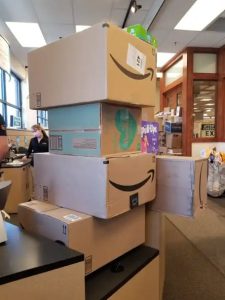
Norma:
A list should be like a book, a resource. Even when you go online, there’s no comprehensive list of food pantries. They name a few, but it’s not all of them.
Bruce:
You had mentioned Catholic Charities earlier.
Norma:
That was in St. Louis.
Bruce:
Do you know if there’s even a Catholic Charities, anywhere here in the Metro East?
Norma:
I think there’s one down in East St. Louis. They had one in St. Louis. I think there’s one in East St. Louis. I know there’s one in Granite City because I worked at a clinic there, and they used to help with some of our patient’s copays.
The future is just getting people to know about it
Karen:
So the future is just getting people to know about it and just spreading the word.
Norma:
Yeah, I think that’s what and reducing the struggle for diaper need.
Bruce:
And this is just one point that needs to be addressed.
Norma:
There’s a new group that’s called Unite Us. They said one of the health agencies had already paid to be in it, and as a nonprofit, they wanted us included too. When the lady called me I said, well, how much is this? She said, oh, you don’t have to worry about it, one of the health agencies has you covered; they wanted to include our non-profit. It’s almost like a United Way, but they just coordinate with United Way, but they’re not part of United Way. if somebody is referred for diapers, a social worker will contact us or if someone needs a resource, we can go in and refer them.
Norma:
They can go into the system and the Metro East Diaper bank will be in there. And then they’ll send us a referral.
Bruce:
Sounds like we need to work on some awareness issues.
Norma:
Yeah. This area is behind the times. When they talk about rural, I used to work for a Fortune 15, and they called Southern Illinois Rural Medicine.
Bruce:
I’ll look forward to maybe working together a little bit on what you’re doing here and trying to raise awareness.
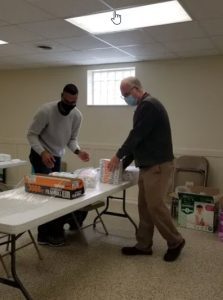
Norma:
There’s also a need for period products, but we didn’t want to get into that now for all the counties because of the overwhelming need for diapers. Maybe for specific, locations like schools. So we’re thinking about that. I know we’ve had a request on base before, so maybe the base and some schools, that’s it. And folks donate adult diapers too and we donate them. However, we do not fundraise for them.
Karen:
All right, well, thanks for your time. It was great to find out more about your story what you do and how you so we really appreciate it.
Bruce:
Well, it gets me excited about what I can do down here.
Let’s make it happen
We’re Bruce and Karen Carlson. We recently moved to the Metro East area of Illinois. This area is east of St. Louis from the Mississippi River north to Alton, east to Carlyle, back south to Waterloo and the Mississippi River, finally north to Columbia. The center is Fairview Heights, Swansea, Belleville, Shiloh, and O'Fallon. Not to be forgotten is Southern Illinois University (SIU) in Edwardsville. It’s a whole new world out there. Our goal with this website is to share our exploration of the Metro East area. As we find businesses and services we use in our daily lives, we’ll share how these businesses and services have helped make our lives better and easier to live.
We’re calling our move to the Metro East area retirement, but we’re not quite sure what that means. By sharing our story with you, we hope you too will gain a better sense of what the Metro East area has to offer and how their businesses and services can improve your lives and build a better community.

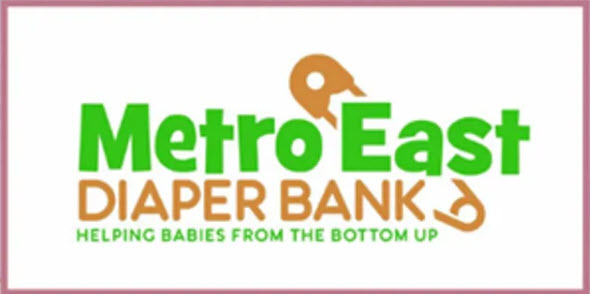

Trackbacks/Pingbacks